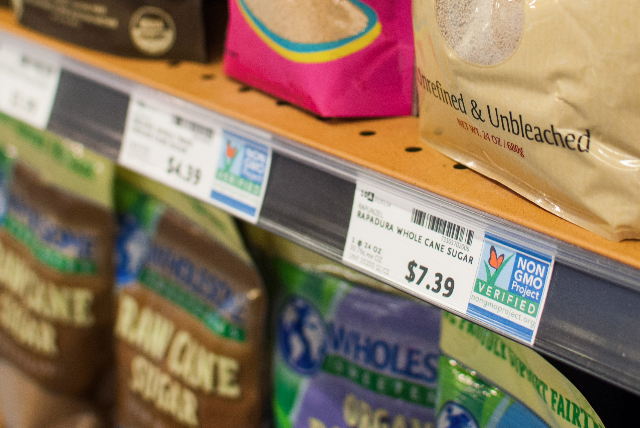Local groups and students in Davis are pushing for greater food producer and consumer rights, according to the recent lobbying and education efforts of both the California Public Interest Research Group (CALPIRG) and the newly initiated Fair Trade Club on campus.
Among the topics being discussed by these Davis organizations, the three issues of Genetically Modified Organism (GMO) food labeling, the overuse of antibiotics in animals intended for human consumption and an increased presence of Fair Trade Certified food products in stores are the most prominent.
Genetically Modified Organisms
Since GMOs were introduced to the U.S. public market 20 years ago, they have flooded store shelves. Though 64 nations currently require producers to identify GMO products on food labels, the United States does not, despite the fact that according to the U.S. Department of Agriculture, 90 percent of corn and 93 percent of soy grown in the U.S. were genetically modified varieties as of 2013.
“CALPIRG is lobbying for a bill that would require labeling of all GMO ingredients on packaging because it believes that consumers should know what they’re ingesting,” said Donna Farvard, a fourth-year economics and international relations double major and the president of the CALPIRG at UC Davis.
Concern about what consumers are ingesting stems from the environment that GMOs are grown in. GMOs are modified so that large amounts of pesticides can be sprayed on them to kill weeds without harming the crops.
According to the National Resources Defense Council, GMOs are highly exposed to pesticides, which associate them with cognitive decline, cancer and negative birth outcomes.
Throughout the years, weeds have become resistant to pesticides, which require a higher concentration to be used for it to be effective. According to Farvard, this is an issue that Monsanto, a leader in GMO development, ruled as “highly unlikely” 20 years ago.
“Studies are being funded by Monsanto, which contributes to corporate control over GMOs,” Farvard said. “That makes it hard to say whether or not they are totally accurate because of the way that funding works. There have been independent studies that have shown the harmful effects of GMOs.”
Currently, CALPIRG at Davis is raising consumer awareness through canvassing while contacting individual stores to encourage them to label GMOs on their own store brands.
“We’ve had a mixed reaction,” Farvard said. “Safeway hasn’t taken a clear stance on it yet, and we’ve been mainly targeting them. There is a concern with the cost of redeveloping their packaging.”
According to Farvard, the most important thing for the campaign right now is to get support from the public.
“We need to make sure we’re getting student and citizen support on the issue,” Farvard said. “We want to show that consumers are concerned.”
Antibiotics in Meat
AB 1437, a California bill that is also supported by UC Davis’ CALPIRG branch, would stop the overuse of antibiotics in animals intended for human consumption.
Food animals raised in squalid conditions are frequently dosed with antibiotics to prevent the spread of disease and infection among the animals — the majority of which are caused by those living conditions.
The U.S. Department of Agriculture pointed out in a 2009 report that antibiotic use can be reduced simply by improving the cleanliness of animal housing and increasing disease testing.
Significant research on animal cleanliness and its effect on antibiotic use has been done at UC Davis, specifically in the Meat Lab on campus.
The antibiotics that are given to the animals are absorbed into the animal’s body, and are then consumed by humans in trace amounts.
“Antibiotics should be used at precise amounts … failure to follow these rules increases the likelihood that some of the bacteria will survive and mutate to become drug resistant,” Garo Manjikian, a CALPIRG legislative advocate, said in a letter to Assembly Member Kevin Mullin. “We need to protect their effectiveness so that they can continue saving lives.”
Farvard said that while some meat production companies have been supportive of the bill, others have said that reducing the amount of antibiotics used in their animals will drive up the costs of their products.
“A consumer group compared the prices and did the math — it’s something like a couple more cents a pound, or even less,” Farvard said. “Any price increase was purely due to a redesign of the way that meat animals are raised.”
CALPIRG’s focus is to give consumers a choice by informing them of the potential of chemicals in their food products.
“Let the consumers make the decision,” Farvard said.
Fair Trade Products
According to Selina Schweitzer, the Revolutionary Armed Forces of Colombia — People’s Army (FARC), a violent non-state actor in Colombia that has terrorized the nation since 1964, received funding from Chiquita, a major worldwide banana producer, until 2007.
Schweitzer is a third-year managerial economics major, and though she is a second generation American citizen, her family still lives in Colombia, and she was inspired to start a Fair Trade Club at UC Davis.
The club seeks to increase the amount of fair trade products available to students on campus. According to Schweitzer, fair trade certified products, in a nutshell, are non-GMO, don’t cause environmental degradation and are grown by workers who are paid a living wage, work in ethical conditions and are not children.
Schweitzer wants to make UC Davis into a fair trade certified university, which would mean that all retail locations on campus would have to offer at least two fair trade products.
Sodexo, the food service company in charge of the Silo and Dining Commons on campus, has started to offer fair trade chocolate as a result of Schweitzer’s effort, but wants to see the demand from students before starting to offer other products consistently.
“The main thing is, you’re voting with your dollar,” Schweitzer said. “To make a difference, it starts with consumers.”
TAYLOR CUNNINGHAM can be reached at features@theaggie.org.
Photo by Amelia Evard.




